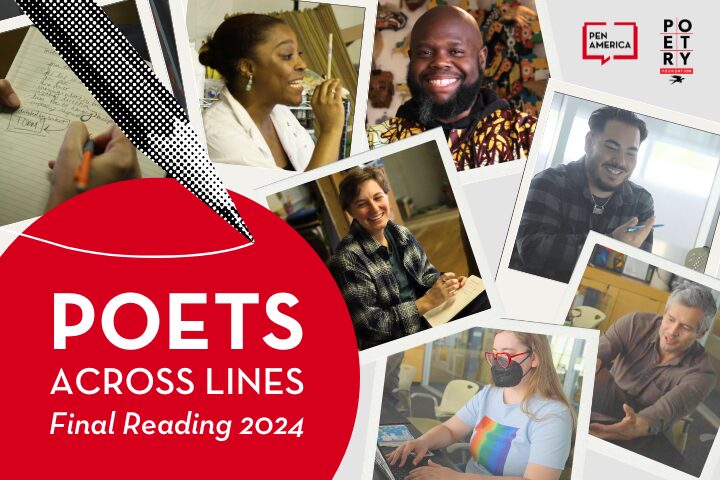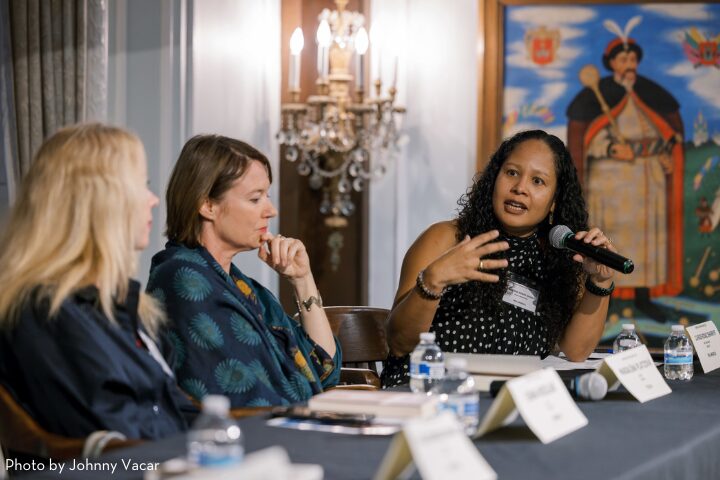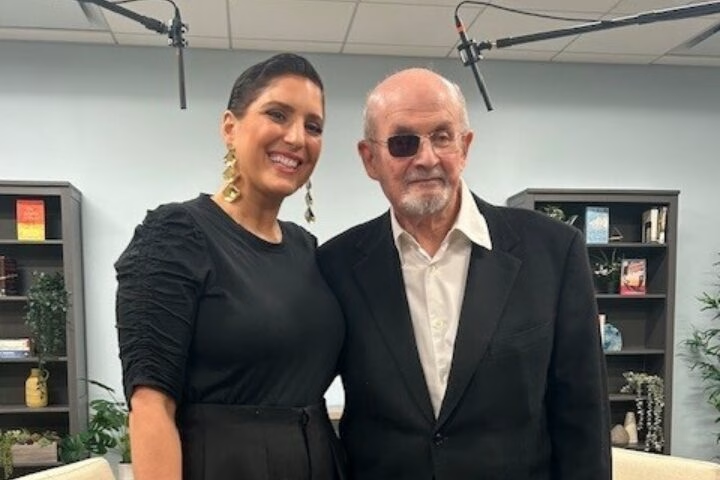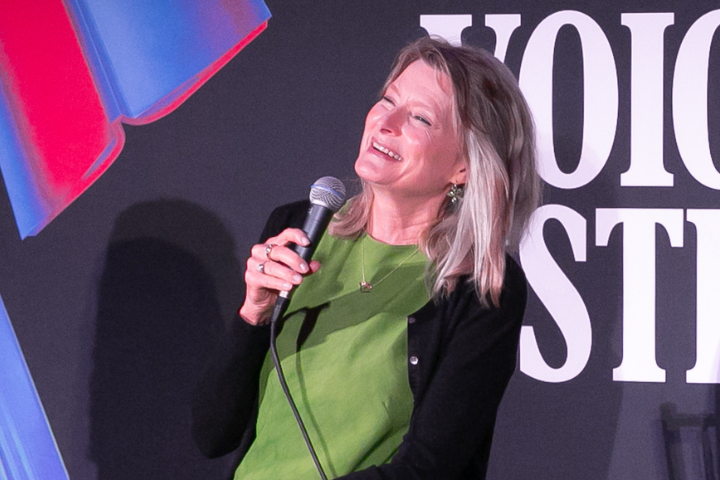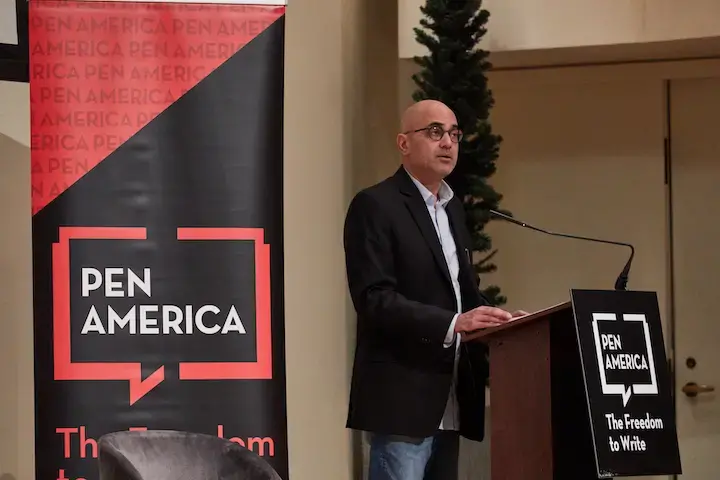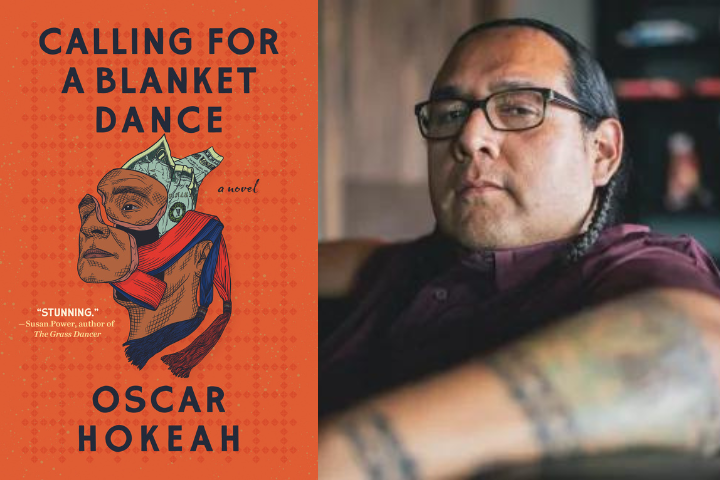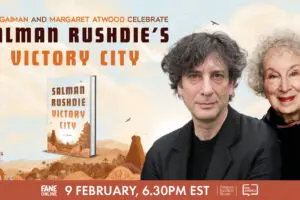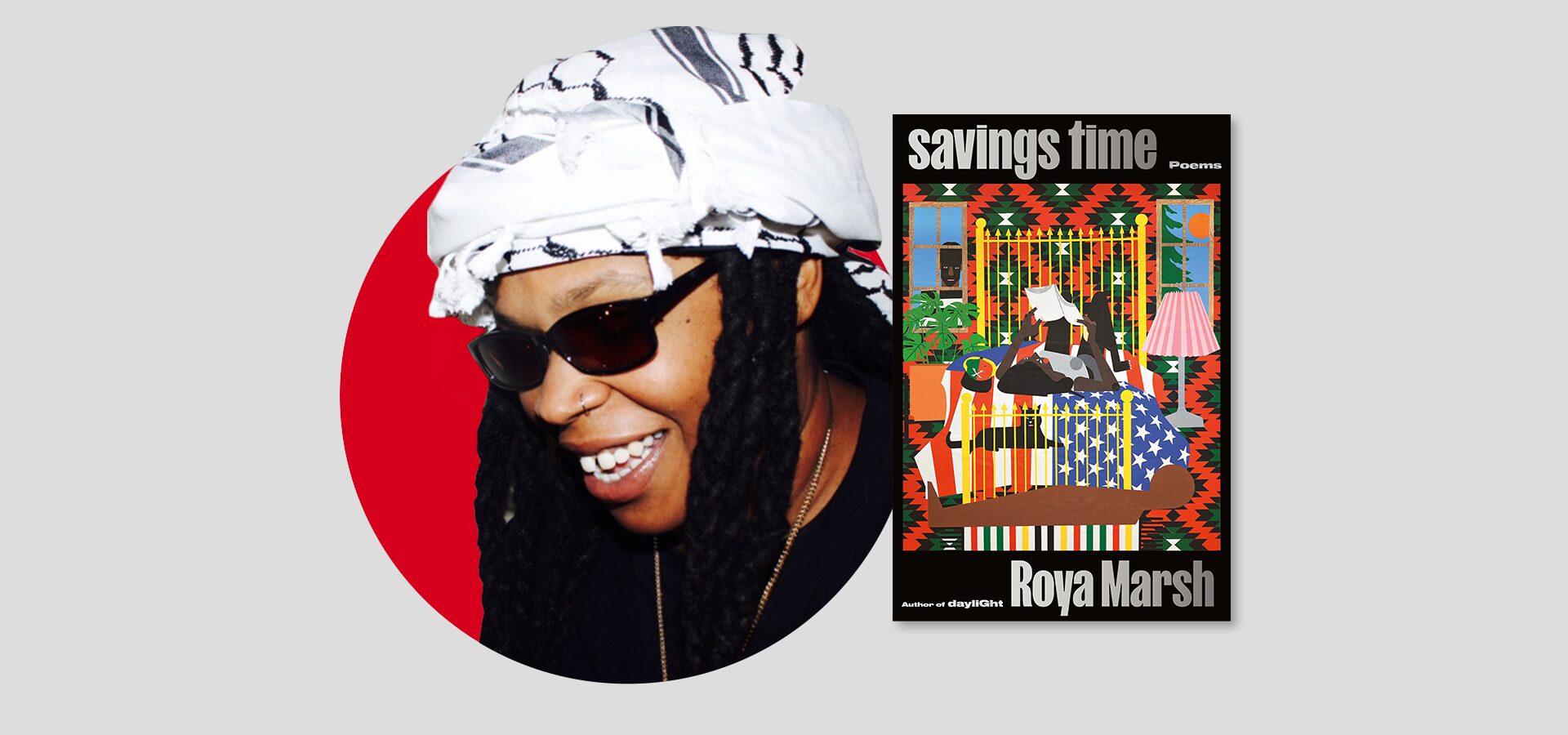
Roya Marsh’s latest poetry collection savings time (MCD, 2025) is an exploration of the joys and hardships experienced by the Black community. In poems that celebrate Black culture while confronting systemic oppression, Marsh’s lyricism –as well as her stage-presence from spoken word performances– is conveyed in written form which amplifies the acoustics behind a rhyme while adding energy and immediacy.
In conversation with Literary Programs and World Voices Festival Manager Sarah Dillard for this week’s PEN Ten, Roya Marsh explains how poetry is resistance, how the N-word is a mirror for the society we live in, and how to find purpose in writing through life’s priorities and struggles. (Bookshop, Barnes & Noble)
1. You use rhyme frequently throughout the poems in savings time, which reminded me of your spoken word work. What is it like writing for the stage vs. the page? Do you make any changes to form or layout in order to convey sound?
All of my writing is created with the same core emotion and message of liberation and it all starts as text. My writing often emphasizes rhythm, pacing, and the performative aspects of language, allowing me to interact with people in real time, whether in an arena or on a reading nook in a cabin. The physicality of performance, sound and purposeful pauses for impact have a powerful effect and help shape the way I create and edit my written work. The rhyme, rhythm, and sound coming from the page play a major role in translating and embedding my delivery into text. I can manipulate the visual layout using line breaks, indentations and punctuation to encourage more intuitive shifts for a reader and to complement the sonic qualities of a live performance. These elements reinforce the energy in my message and strengthen the connection with readers.
2. Your poem “Admissions of Guilt” begins with the line “I play with the dead.” How do you find beauty in darkness? Given the systemic oppressions on the Black community leading to inequities across all fields, how do you turn this into art?
Darkness is beautiful. The worst things are happening in broad daylight, but I think darkness gets a bad rap. Seeing darkness as beautiful, particularly when addressing systemic oppression and inequities, is an act of resilience and resistance. Poetry is a vehicle for processing life’s joys and sufferings – to transmogrify them into something useful. I hope to encourage both healing and reflection by writing into these topics. I hope to use my craft to explore the complexities of my unique Black lived experiences, confronting these challenges head-on while still allowing for moments of beauty, hope, and joy.
In the face of inequity, reclaiming my own narrative might look a lot like finding beauty in the darkness. To me, the simple act of creating is honoring the moments of grace and solidarity that exist even under the most difficult circumstances. I believe beauty lives in the act of creating—by crafting a powerful poem out of darkness or adversity, I am sharing not just a reflection of my struggles, but also a way forward, an invitation for you to see and to understand.
The worst things are happening in broad daylight, but I think darkness gets a bad rap. Seeing darkness as beautiful, particularly when addressing systemic oppression and inequities, is an act of resilience and resistance.
3. Despite the every day struggles faced by yourself as a Black, queer woman, you take the time to write and create. Your friends, who deal with similar daily stressors, aren’t always able to support you due to priorities such as food and housing. What drives you to poetry? Where does your purpose come from?
I am driven to writing and create poetry because The Bronx already has Remy Ma, haha. Writing has always been a way for me to make sense of my feelings and experiences. I get to process being a Black, queer woman and the multiple layers of discrimination and oppression I face. Here, I get to be playful and it’s much less solemn than a therapy session. I can turn my struggles into thorns and prune them. I can be mysterious and personified or audaciously assert my own humanity. I can tell my truth and find community with those who feel the same.
Poetry transcends the limitations of everyday life. When my friends, who live in the same oppressive world, can’t support me in the traditional sense, I know that our shared experiences and mutual understanding are woven into my work itself. Living under the pressures of capitalism, economic disparities, and political polarization makes supporting anyone seem like an impossible task and that’s on purpose.
My purpose comes from a commitment to affirm my existence and the existence of those like me—those who may not have the space or resources to be seen but whose lives and stories deserve to be told. Poetry becomes the bridge between my inner world and the larger one around me, allowing me to exist fully and authentically in a society that wants me dead.
4. The title of the collection, savings time, comes up in the poem “Having a panic attack in the back seat of an Uber.” The poem is frantic, fast, and readers have to actively slow the pace of their reading in order to hold onto each moment. What is the value of time for the Black community? How does the relationship with time differ from other ethnicities/races?
Do readers have to do that to hold onto each moment? Or is it a choice? I can’t speak for the Black community, but to me, time holds a unique and complex value. My understanding of time has been shaped by histories of systemic oppression, colonization, and Black peoples’ commitment to our continued existence. My understanding of time has been shaped by histories of royalty, ingenuity, and Black Joy. Time was presented to me as a commodity that’s constantly slipping away—be it through the burdens of economic inequality, racial profiling, or the daily toll of fighting for recognition and rights. In savings time, and particularly in the poem mentioned, I think time is portrayed not as something easily controlled or understood but as something that is, in many ways, out of reach. Life is a frantic race and this poem is a reminder of how quickly moments and people can be lost, not just in the sense of minutes ticking by but in the way opportunities, justice, and even safety are often denied to Black people.
The frantic pace of the poem mirrors how time often feels when you’re in survival mode—everything is urgent, everything is a race, and yet, you’re running on a clock that wasn’t designed for you. Time isn’t just about the minutes passing; it’s about the weight of those moments, the sense that you are always running out of it, but still finding ways to resist, create, and demand more. Generations of Black people have lived under the weight of delayed freedoms, deferred dreams, and struggles for equality that seem to never fully materialize. Our time has been stolen and disrupted. We have done and continue to do the work to reclaim our time through cultural practices, organizing our communities, honoring our histories and centering joy despite the hardships.
Time was presented to me as a commodity that’s constantly slipping away—be it through the burdens of economic inequality, racial profiling, or the daily toll of fighting for recognition and rights. I think time is portrayed not as something easily controlled or understood but as something that is, in many ways, out of reach.
5. There is a stark power dynamic between Black individuals and the police which you write about in “living dead.” Where do you draw power from considering the circumstances? Is there anything you do to not feel powerless?
The power dynamic between Black individuals and the police is stark and terrifying because it highlights the dehumanization that Black people often face in these encounters. That powerlessness I felt wasn’t just personal—it was historical, institutional, and collective. It’s a constant reminder that our bodies, our lives, and our existence are often treated as less than valuable. Realizing that rendering me powerless is the intended result of the power dynamic awakened me to the power I possess.
I draw power from my family and my community, the people who share similar lived experiences and empathize with the nuances of our survival stories. We do our best to hold each other accountable because we know the incredible power in solidarity. In order to avoid feeling powerless, I shifted my focus to where my power lies. I center acts of self-preservation. Something as small as pausing to breathe or seeking out moments of joy and connection with others who understand rejuvenates me. Moments of defiance remind me of the power in my bloodline. I look to the legacy of Black resistance, resilience, and survival. I look to the stories of ancestors who fought and present-day activists who continue the work. This reminds me that power is not always about grand gestures; sometimes it’s about endurance, small victories, and the refusal to be erased. I remind myself that the power systems designed to oppress me are fragile, and the very act of continuing to live, create, and resist is an assertion of power in itself. Even if it’s quiet, it’s still mine and no one can take it from me.
6. Art is a form of protest, and savings time tackles many political topics – even naming certain politicians and policy makers. Do you see poetry as a form of resistance? Why or why not?
For sure, I definitely see poetry as a form of resistance. Art, in every form, holds the power to challenge the status quo, expose injustices, and make room for those who are often silenced. This is my attempt to refine the intricacies of life into poignant, emotional truths that can reach places politics or policy can’t. When I’m writing, I am in conversation with structures of oppression so I need to name them. It allows me to articulate the lived realities of those whose stories are too often ignored.
Poetry has the distinctive ability to communicate directly with emotion making it a powerful tool for resistance. By naming politicians, policies, and systems of power in savings time, I’m not just referencing them for the sake of critique but for the sake of accountability. These names, these figureheads, these policies—they shape the realities we live in, so addressing them in my work is a way to hold them up to the light. I’m saying, “You can try to ignore this, but I will not let you look away from what you’ve done.”
Poetry will not always be loud or confrontational and will still be resistance; sometimes, it’s the quiet act of claiming something as your own. It can serve as an act of rebellion and a way of unveiling the truth that others might prefer to sweep under the rug. It creates new possibilities and new ways of seeing and being. It reminds us to dig a little deeper, listen more intently and read more closely. Curiosity is a radical form of protest.
Power is not always about grand gestures; sometimes it’s about endurance, small victories, and the refusal to be erased. I remind myself that the power systems designed to oppress me are fragile, and the very act of continuing to live, create, and resist is an assertion of power in itself.
7. The role of a Black woman in a family is fairly different from a white woman’s role or another race/ethnicity’s role. The need to care, provide, and protect creates added responsibilities that take time and energy. What has been the greatest influence of Black women on your approach to life? How have they changed the way you see the world?
Mmm. I don’t believe the role itself is that different, but I know many people want to feel like it is. The greatest influence of Black women on my lifestyle is the deep understanding and the way that they carry themselves and share multiple roles despite the weight of systemic oppression. Black women are the spine of this country, compelled to be caregivers, providers, and protectors without the respect or support they deserve. Witnessing how Black women in my life—family, friends, elders—make space for themselves and others has instructed me on how to make it through my own difficulties, how to fight for what I require, and how to care for myself even when the world seems hell-bent on draining the life out of me.
Black women have taught me perhaps most importantly, the importance of community. It’s not about personal survival, though; it’s about taking other people up with you along the way. Black women have long been forced to rely on one another to survive, and that feeling of oneness has informed the way I live. I’ve come to understand that simply surviving is not good enough—thriving, together, is what matters. Their capacity for spreading joy, laughter, and love amidst struggle has redefined strength to me. It’s not stoic endurance but seeing beauty, strength, and healing even in the hardest circumstances.
The way Black women carry and stand ourselves up in a world that often attempts to devalue us has changed how I see the world. I have come to discard the idea that my worth is based on anyone else’s thoughts or expectations. I have seen Black women construct spaces of agency and autonomy, pushing back not just on societal expectations but also on the narratives that seek to contain us. From the way we fiercely protect our mental health to the way we honor our skin, the unapologetic presence has taught me to unapologetically own my own humanity, with all its flaws.
Black women have also shown me that resistance is not just about fighting against systems of oppression—it’s about creating the life I want, even when the odds are stacked against me, I am rooted, defiant, and connected to a larger purpose.
8. My first exposure to the N-word was in a Missy Elliot song, and when I asked my dad, who is Black, what it meant, he said that it was a “bad word for Black people.” Throughout the Black community, many people feel very differently about the word. What is your relationship to the N-word and why did you decide to include it in your poetry (in both positive and negative contexts)?
I wasn’t raised on the concept of words being good or bad. I was raised in a household of niggas. The niggas in my family are doctors, educators, coaches, engineers and artists. My parents did their best to assure we knew that we were Black and that we are the most beautiful and powerful when we were just being ourselves. I learned that niggas could be my best friends or my enemies before I learned the historical context of the word. To me, if a word is bad, it has to be bad in every sense. Me saying nigga doesn’t give anyone else license to say the word or wield it with malice. The N-word holds a complex and deeply layered history within the Black community, and my relationship to it is shaped by that history. It’s a word that has been used to degrade, dehumanize, and oppress Black people for centuries, but it’s also been recontextualized and reimagined in ways that reflect our resilience and creativity. How I feel about the word, and how I use it, is deeply personal and tethered to my individual experiences, family history, and community dynamics.
For me, the N-word has always been a reminder of the immense power words hold—both to hurt and to heal. It’s a word that can carry with it the weight of generations of trauma, but it can also be used to signal solidarity, camaraderie, and shared experience. When I say nigga to my niggas, I want them to know I hold them in my heart. A non-Black MTA bus driver calls me a nigger (true story) and he wants me to know he holds me in contempt.
In my poetry, I’ve chosen to include the N-word in both positive and negative contexts because it reflects the tension that exists with the word itself. I acknowledge the complexity of its history and the ways in which it’s lived in my own mouth. In its positive use, it becomes a term of endearment, a way to call my beloveds in. In its negative use, it’s a reminder of the way it was wielded to oppress, marginalize, and erase our humanity. I’m not only grappling with the contradictions it holds but also showing the multifaceted ways that Black people interact with it. The inclusion is not meant to be an endorsement of its use, but rather a way to explore how we navigate its power, both for and against us. It’s a choice to confront its loaded history and to reflect on how language is constantly shifting—how it can be twisted and reclaimed, depending on who is speaking it, who is listening, and the context in which it’s said.
Ultimately, the N-word is a mirror to the world we live in—a world where Blackness is both glorified and vilified, and where we are constantly negotiating our identities, our histories, and the words that define us. The late Paul Mooney said, “Everybody wanna be a nigga, but don’t nobody wanna be a nigga.” Through my poetry, I examine this struggle and make space for the different ways I choose to resist, and understand the
language that has been thrust upon me.
Black women have also shown me that resistance is not just about fighting against systems of oppression—it’s about creating the life I want, even when the odds are stacked against me, I am rooted, defiant, and connected to a larger purpose.
9. Given the history of the Black individual in America, from chattel slavery to present day, it is difficult to feel at home or welcome. Where do you find a place in this country? How does your place relate to your poetic practice?
In a country where the history of Black individuals is painted with violence, displacement, and dehumanization, finding a sense of place is supposed to feel impossible. The weight of centuries of chattel slavery, segregation, systemic racism and capitalism, created an environment where belonging isn’t for everyone; it’s sold separately, often made for sale by the forces that seek to exclude you.
My place in this country is not static—it’s a dynamic, shifting space that I have to ground myself in constantly. My grounding is in the ways I navigate a nation that wasn’t built for me, but was built on the unpaid labor of my ancestors whose optimism and survival set the blueprint for ways to thrive, to resist, and to reclaim power. That directly informs my poetic practice. My writing is an act of defiance. I am carving out space where I can be free, where I have my joy, my pain, my anger, my love, and my resistance roam freely. My place exists in the relationships I build—with family, friends, and community. My place exists in the act of writing. My place is where I can speak unapologetically, where my words exist without boundaries, and where my Blackness is not only welcomed but celebrated. When I write, I build that place again and again, reminding myself and others that we belong—here, in this country, in this moment, and in the legacy we continue to create. Until we decide otherwise.
10. James Baldwin’s famous quote, “To be a Negro in this country and to be relatively conscious is to be in a state of rage almost all of the time,” reminds me of some of the poems in savings time. What are your favorite things to do to release and heal from this pain? What would you recommend to others whose identities are under attack?
I love me some Baldwin and I love this quote because it captures the perpetual tension and frustration of being a hyperaware marginalized person in a country with an obligation to misunderstand me. Rage can be paralyzing and suffocating, so having ways to dress our wounds is necessary. Resting is one of the most healing things that I can do. I withdraw from weary ways of this world to rest my mind and seek solace in everyday routines like my morning rituals of tea in my garden. I acknowledge the grounding properties of being in nature. Catch me out taking a stroll with my feet grounded or simply lounging and watching my neighborhood ballers on the court. There is healing in remembering the quiet and simplicity of nature because the world we’re living in is just so loud and chaotic. Community, community, community! My people play an essential role in my healing. Being with my loved ones in places of mutual care, understanding, and collective resistance is what keeps my heart pumping. Sometimes, laughing ’til you cry is all it takes to take the edge off the pain.
If you are being targeted in your identity, I would recommend fighting back. Find the avenues where you can shed the burden of it all—be that through art, exercise, therapy, or just spending time with other individuals who understand. Healing is not linear and it takes much effort to figure out what works best for you. But, above all, I would recommend: letting yourself feel. There is no shame in anger, sorrow or fatigue. What matters is how you make it through, how you recover and who you become because of it. Make space for joy. It is always there. Remember to provide yourself with moments of bliss, tranquility and pleasure. It is a revolutionary act love and care for yourself in the face of opposition.
Roya Marsh is a Bronx, New York, native and a nationally recognized poet, performer, educator, and activist. She is the author of the poetry collection dayliGht, which was nominated for the 2021 Lambda Literary Award for Poetry. The former Poet in Residence at Urban Word NYC, Marsh’s work has been featured on NBC, BET, and Def Jam’s All Def Digital, and published in Poetry, The Village Voice, Nylon, Huff ington Post, and in the collection The BreakBeat Poets Volume 2: Black Girl Magic.

